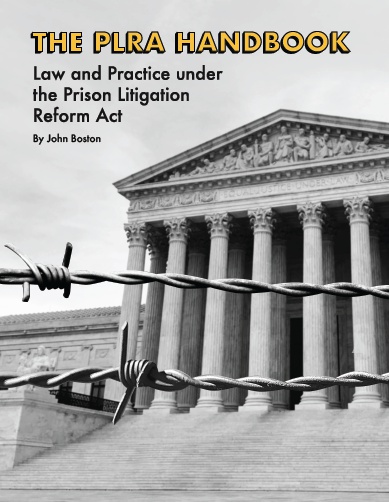Article on PA "Silencing law" quotes PLN editor
Suit claims ‘Silencing Act’ restricting speech of Pa. inmates is unconstitutional
January 27, 2015 12:00 AM
A new Pennsylvania law allowing victims of personal injury crimes to bring civil action against inmates who engage in “conduct which perpetuates the continuing effect of the crime on the victim” is being challenged by media and other civil rights groups that fear the law could have a chilling effect on free speech.
The law approved in October allows prosecutors or crime victims to seek an injunction when an convict’s behavior may cause a temporary or permanent state of “mental anguish.”
It was unanimously approved by the Pennsylvania legislature after Mumia Abu-Jamal, who is serving a life sentence for the 1981 shooting death of Philadelphia police officer Daniel Faulkner, delivered a pre-recorded commencement address to Goddard College in Vermont.
Rep. Mike Vereb, R-Montgomery, a former police officer, introduced the bill after he learned of the plans for Abu-Jamal’s commencement address.
“I am utterly outraged that such a reprehensible person would be able to revictimize Officer Daniel Faulkner’s family with this kind of self-promoting behavior,” Mr. Vereb wrote in an Oct. 2 memo seeking co-sponsors for the bill. “I am asking your support for a bill, the Revictimization Relief Act, that would put an end to this kind of shameful misconduct.”
As written, the law would allow the victim of a crime, a district attorney or an attorney general acting on the victim’s behalf to file a civil lawsuit to stop the “misconduct which causes the victim or the victim’s family severe mental anguish.” Mr. Vereb’s memo states, “The courts would then have the power to issue an order stopping the victimization.”
Abu-Jamal has attracted international attention to his case since he was convicted with claims that he is the victim of a racist justice system. That activism has angered, among others, Mr. Faulkner’s widow, Maureen. Abu-Jamal is serving a life sentence with no possibility of parole.
“This unrepentant cop killer has tested the limits of decency,” former Gov. Tom Corbett said when he signed the bill into law in October. “Gullible activists and celebrities have continued to feed this killer’s ego.”
The lawsuit filed earlier this month in U.S. District Court for the Middle District of Pennsylvania, in which the plaintiffs refer to the new law as the “Silencing Act,” seeks a preliminary injunction. It claims the law is unconstitutional, restricts speech and is not based on any compelling government interest.
Journalist Christopher Moraff, one of the plaintiffs in the lawsuit, said the new law could have a chilling effect on inmates’ communications, possibly preventing them from speaking to the press about conditions in Pennsylvania jails.
“It took a little time for it to sink in,” said Mr. Moraff, a freelance journalist who covers criminal justice issues. “But if you put a gag on offenders or inmates, you’re cutting off an important channel if information. People rely on speech as part of their rehabilitation, in terms of advocating for their own cases.”
He added a common misconception about the law is that a victim could only sue if the offender is speaking about that specific crime. “It’s extremely vague, so that we’re not just talking about the crime, but about any activity or speech,” Mr. Moraff said.
And if a reporter interviews an inmate or ex-convict and the victim of that individual’s crime gets wind of it, as the law is written, the victim could seek to stop publication of a news story, Mr. Moraff said.
Under the new law, prosecutors can also seek injunctions to block speech or conduct that would fall in that category.
That is particularly troubling to Paul Wright, editor of the Lake Worth, Fla.-based publication Prison Legal News, which also is a plaintiff in the lawsuit. Ninety-five percent of Prison Legal News’ submissions come from inmates, he said, and Abu-Jamal writes a regular column.
“As a publisher, if I publish anything written by Mumia, will we get sued by the state of Pennsylvania?” he said.
There already are laws prohibiting libel and slander, he added. “I think it’s loud and clear that this is about silencing prisoners, and assuring they don’t have a voice in the public discourse. This has nothing to to with public safety, or protecting the victims of crime.”
Prisoners, he added, are often victims of violence themselves while in jail. Limiting their speech may restrict their ability to report such crimes.
On Monday, Mr. Vereb said the law was intended to “empower” victims of crime in Pennsylvania. “Without this law, crime victims were largely at the mercy of their aggressors,” he said in an email. “Crime victims had no way to approach the courts to prevent their aggressors from re-victimizing them again and again.”
Witold Walczak of the American Civil Liberties Union in Pennsylvania and attorney for the plaintiffs, said the state attorney general and the district attorney of Philadelphia have until Feb. 6 to respond to the complaint. A hearing has been scheduled before a judge in Harrisburg on Feb. 26.
“Our position is that you cannot silence prisoners,” Mr. Walczak said. “And society should be wary of any law that tries to silence prisoners.”







